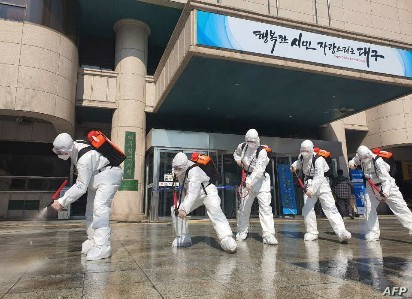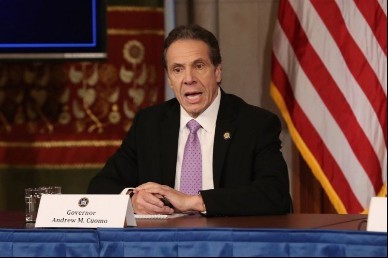The corona virus outbreak, which emerged in China in December 2019 for the first time, is still ongoing. In the beginning, most patients were in Asian countries near China, such as Taiwan, South Korea, Japan and some other Southeast Asian regions. However, it wasn’t long before the deadly virus spread from Asia to Western countries. Currently, the United States is emerging as one of the heaviest hit and world citizens are concerned about the consequences.
 |
| ▲ In order to prevent the spread of COVID19,quarantine experts are disinfecting the place where the confirmed patient visited.(Photo from VOA) |
The countermeasures introduced to contain COVID-19 vary from country to country. In the United States, Critics believe that President Trump’s initially indolent reaction to the outbreak as the reason they are in their current situation. Instead of spending a lot of time examining the virus or isolating the suspected patients, the nation stood by and watched as it evolved. Consequently, the number of infected persons in the United States increased exponentially, especially in New York. New York governor, Andrew Cuomo asked for help from all available medical practitioners and extended their shutdown term to at least May 15. In contrast, Taiwan prevented the further spread of COVID-19 by their quick initial response. First, they banned Chinese citizens from entering the country and introduced a self-reporting system for suspected patients, imposing high fines for people who did not follow self-quarantine. The United Kingdom planned a natural stabilization. However, since the testing system was imperfect, they had a lot of difficulties confirming the number of infected people. Korea tried to respond quickly to COVID-19 from the beginning because it is located close to Wuhan city, the origin of the virus. Thanks to the devotion of medical practitioners in the nation, the number of people testing positive for the virus in South Korea is decreasing.
These positive moves to get control of the deadly disease have come at a cost. The virus has made an impact on all economies. Many people insisted that the world suffered from the worst economic crisis in 2008, however these days, the world is experiencing an economic impact we have not seen before. According to Kim Yun-yeong, a professor in the Dept. of International Trade at Dankook University, it is difficult to move between countries due to the spread of the corona virus. This will greatly reduce international trade and accelerate the global economic recession. In the short term, Asian countries that have close financial relations with China will experience economic impacts. South Korea, which has high degree of dependence upon international trade, is more likely to suffer from economic decline than the United States and Japan, which are relatively less dependent on trade. However, as the world is deeply linked due to globalization, it is predicted that all countries will continue to struggle from this economic recession over an extended period of time.
After the outbreak of COVID-19, countries began enforcing policies to respond to the virus. As Korea had a problem with a lack of paper masks, they enforced a mask distribution policy. Also, to reduce further spread of COVID-19, they recommended social distancing and informed people of the infected person’s route. While Europe blocked all tourist attractions, New York also blocked access to sights, gyms, bars, and museums. They prohibited eating food inside restaurants and shut down most stores except marts. Thanks to the quick initial response, Taiwan was able to return quickly to a normal life. The number of confirmed patients decreased, and universities returned to offline classes.
The declaration of an end to COVID-19 by the city of Wuhan will soon allow Chinese people to enter to many countries, but no nation should let down their guard, since the number of patients is still increasing around the world. In addition, as former U.S. Secretary of State Henry Kissinger wrote in the Wall Street Journal on April 2, "The reality is the world will never be the same after the corona virus." It is time for the world to think about its new paradigm to rebound from the effects of COVID-19.
 |
| ▲ Newyork Governor Andrew Cuomo briefing about corona pandemic. (Photo from New York Post) |
서채원,이지희 dankookherald@gmail.com

 Vote for the Campus Brand Naming!
Vote for the Campus Brand Naming!

![[Campus Magnifier] Let's Surf the Library!](/news/thumbnail/202404/12496_1765_4143_v150.jpg)




